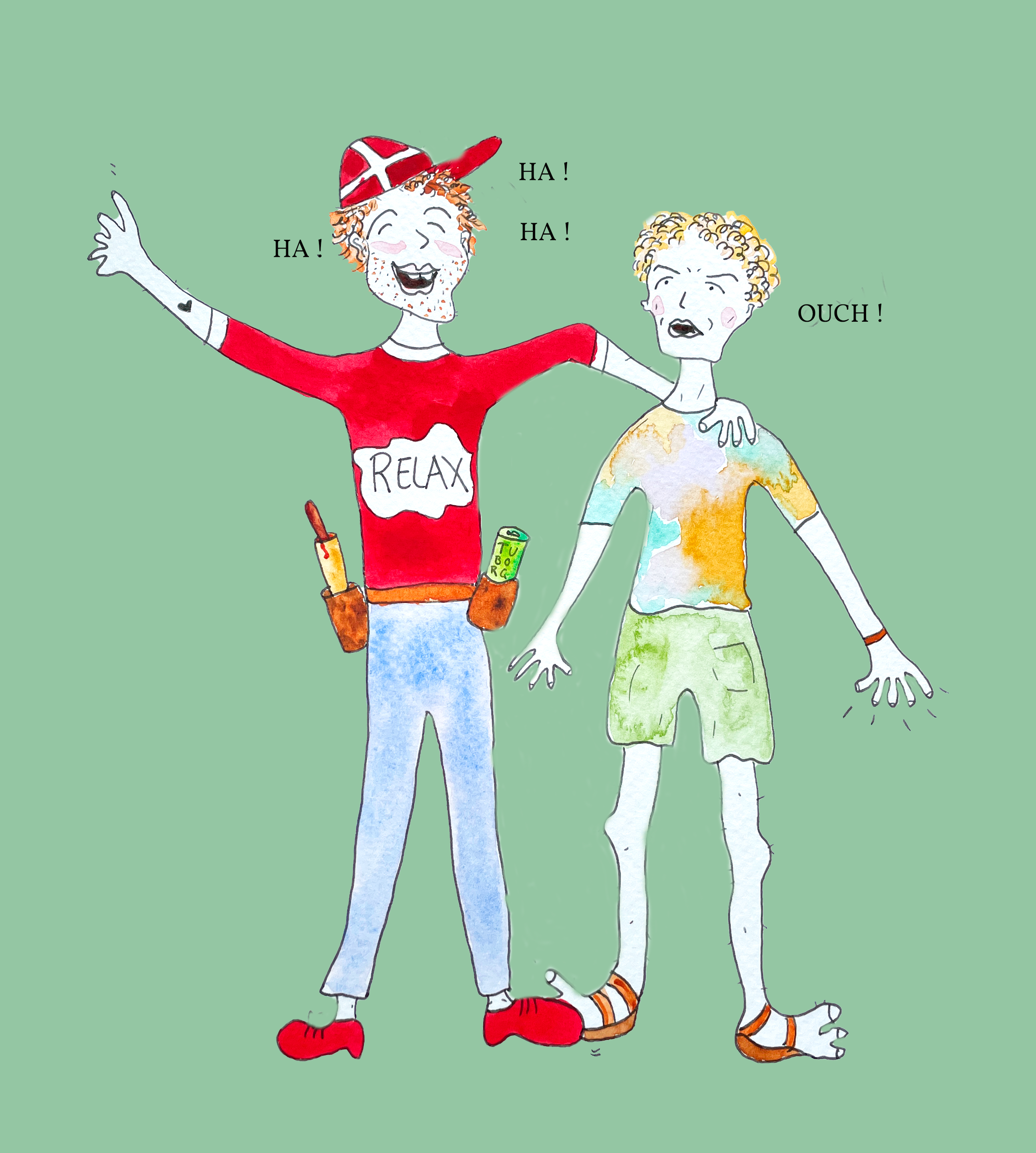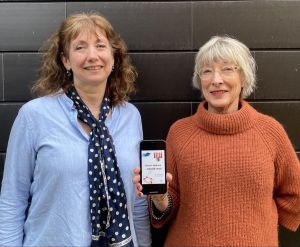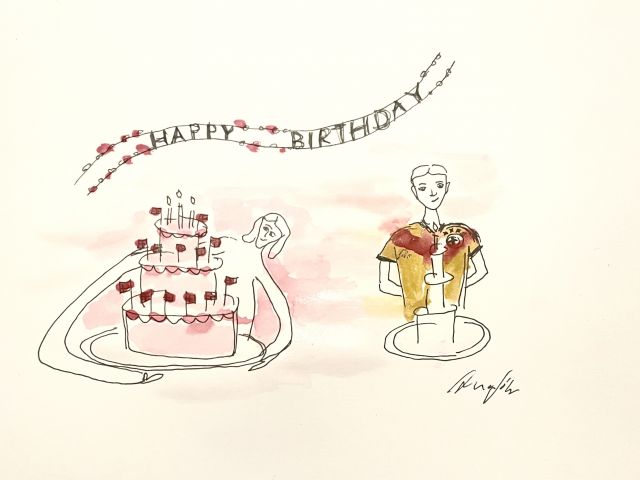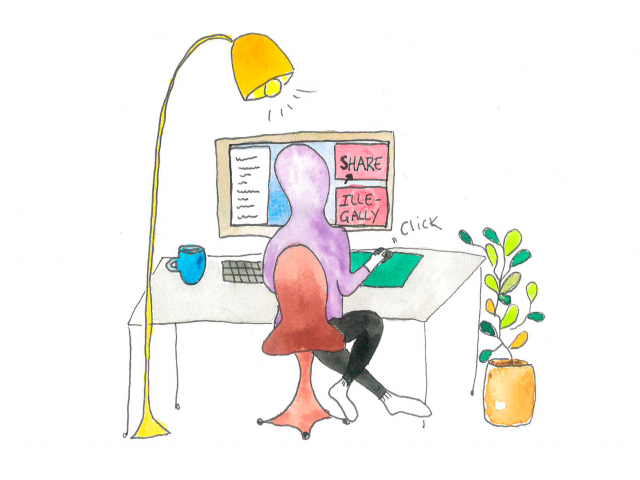Danish humour: a fast track to hygge or treading on toes?

Danish humour can be quite overwhelming, according to the writers behind a new book. (Illustration: Ida Eriksen)
Humour is essential everywhere – in all walks of life. But how does humour work? And is it always helpful? Humour researcher and professor emeritus at CBS Lita Lundquist and British-born, Danish-based Helen Dyrbye, translator and principal author of The Xenophobe’s Guide to the Danes, have co-authored a new book called Danish Humour – Sink or Swim and have some advice on how humour can backfire across cultures.
Researcher Zone | 21. Jun 2022
By Lita Lundquist, professor emeritus from CBS and Helen Dyrbye, author and translator at CBS WIRE
What is humour, anyway?
Not everyone agrees, for a start, and interacting across cultures adds more complications. Lita Lundquist’s most recent research has focused on humour that crops up spontaneously between people engaged in conversation in a business setting.
The 73 people she interviewed from 14 different countries spanned many different fields, including international university programmes and the European Parliament.
Their responses are featured in detail in her book Humorsocialisering. Hvorfor er danskerne (ikke) så sjove (som de selv tror)?, which explores why the Danes are not as funny as they think they are, and reveals that non-Danes and Danes clearly experience and judge humour events differently.

Here you see Lita Lundquist and Helen Dyrbye together. (Photo: Nikoline Rosenbjerg Kjeldsen)
Mind the gap
According to her data, non-Danes often find Danes’ spontaneous humour blunt, harsh and aggressive. Danes, on the other hand, are unaware of the negative impact they can have.
They happily carry on firing off one-liners that they think are appropriate, kind and welcoming but that are actually sinking their chances of making a good impression.
Like many expats and people working or living with Danes, Helen Dyrbye could instantly relate to Lita Lundquist’s findings.
With Danes, ironic comments are greatly appreciated and often begin as soon as you walk through the door
Lita Lundquist and Helen Dyrbye
She had experienced first-hand on multiple occasions the uncomfortable mismatched perceptions of humour in work conversations across cultures.
Together they set about defining where humour comes unstuck, and here are a few pointers based on their experience.
Immediately in the hot seat
Danes use humour to establish common ground and hygge – a cosy atmosphere. Straight away. By making an ironic comment, they are trying to be inclusive by reaching out and inviting the other person to join in what they see as ‘the fun’.
So with Danes, ironic comments are greatly appreciated and often begin as soon as you walk through the door – with total strangers. For instance:
Ms Dyrbye (British): “I’m sorry I’m late. I couldn’t find a parking space anywhere.”
Mr Jensen (Danish): “Try driving on the right side of the road!”
Ouch. Non-Danes would not realise that such a direct comment was intended to be funny because it would be delivered without a smile, as is the Danish custom.

And though both parties would quickly realise there is an uncomfortable mismatch of expectations, they might not immediately grasp why.
The non-Dane in the example above would feel threatened and singled out, not least because this was the first time those involved had ever met.
The Dane, coming from a society with high levels of trust, would assume that the comment would be seen as funny. After all, why would he deliberately say something offensive? That would make no sense at all. Of course he was joking!
Flat delivery
Such Danish irony relies on a dry or deadpan delivery. This involves an absence of cues that in other cultures signal humour – a smile, change of intonation, or raised eyebrow, for instance.
The Danish language does have a variety of small words to signal that comments should not be taken at face value.
The problem is that these words, such as vel, nok and jo are so subtle that they are often overlooked. They are important, however, because they mark distance and reservation to what is being said.
Understandably enough, when Danes are speaking foreign languages, these small words, which are almost impossible to translated, are left out. That makes comments sound much more direct than intended.
For instance, when a French scientist was asked why he had not yet learned to speak Danish, he explained that he was having trouble getting into evening classes to learn the language. Quick as a flash, a Danish colleague quipped in English:
“You should get a divorce and marry a Danish woman.” The Frenchman was severely offended: “It came up very coldly in a discussion, and as it was at a moment when I was trying desperately to learn Danish, it was very hurtful.”
In Danish, the comment would have probably included one or several signal words:
“Then you’d jo, da, vist/vel, nok better divorce and marry a Dane!” to warn that the comment was to be taken with a pinch of salt and a smile.
Crossing the line
The above comment also reveals another problem with Danish humour – that Danes joke about all kinds of topics that would be firmly off limits to other nationalities at work.
Suggesting that the French scientist should find a Danish wife crosses well over the line of mixing business with pleasure and professional life with private life.
Another of the many examples featured in Danish Humour – Sink or Swim involves a Danish head of communications who exclaimed to a young Brit a few moments after they met for the first time and entered a conference room together:
“Is it hot in here or is it my menopause?” The comment was probably made partly in fun to establish common ground between the two women. However, personal health issues, along with politics, religion and finances, are best avoided in professional contexts in most other cultures
The other side of the story
The co-authors take pains to clarify, however, that humour is a joint responsibility.
With its amusing(?) ‘crime scenes’, their book helps international readers interacting with Danes to open up and accept the friendly intention underlying Danish humour.
Danes, for their part, can understand why their humour is viewed as ‘in your face’, ‘inappropriate’ and even downright ‘rude’ by their international colleagues.
Making headway
With luck, the pointers above, and the insight on ‘politeness’, ‘padding’ and practical guidelines in Danish Humour – Sink or Swim, will generate healthy discussion.
And as the message spreads and gains a foothold, perhaps work satisfaction – and home life in general – will ultimately improve as we all begin to appreciate humour better across cultures.







































































































































Comments